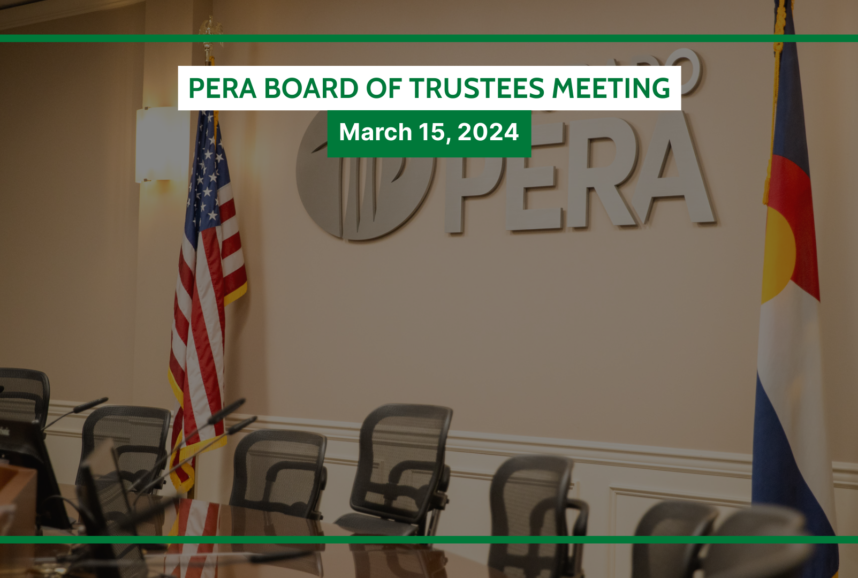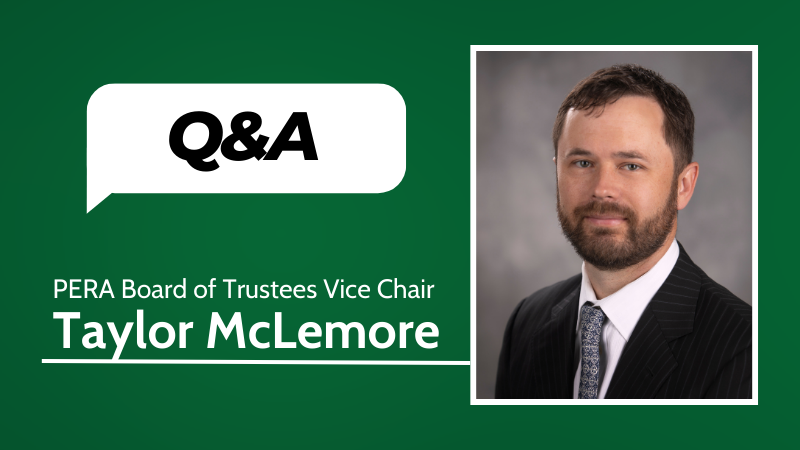On Tuesday, October 3, Colorado PERA conducted telephone town halls for members and retirees. If you missed the calls, recordings have been posted here.
A summary of the most asked questions and responses is below.
Why is the Board recommending benefit cuts and contribution increases when the stock market is at a record high this year?
The Board’s recommendations are intended to reduce PERA’s risk profile in the future, making PERA more sustainable and able to adapt to our changing environment. Two key changes have increased the time it will take PERA to become fully funded. First, the PERA Board lowered the long-term rate of return assumption (which made the cost of providing retirement benefits higher). While the U.S. stock market may be doing well this year, the long-term forecast for the global financial markets is not as optimistic. (Read more about PERA’s diversified portfolio of investments and its risk profile.) Second, the Board adopted new mortality tables that reflect the longer lives of PERA retirees.
Haven’t retirees already sacrificed enough with the reduction in the COLA in 2010? Why can’t PERA members who are still working pay more?
The Board is keenly aware that recommended changes impact public employees who have provided valuable services to the state and their communities. The Board’s approach to lowering PERA’s risk profile was to spread the responsibility of ensuring PERA’s financial strength across the PERA membership (this includes PERA’s employers). More than 90 percent of PERAtour attendees agreed with the principle that the PERA benefit should allow retirees to maintain their standard of living throughout their lifetime, meaning that a dignified retirement starts with a livable base benefit that is maintained through annual increases. And more than 80 percent of PERAtour attendees agreed that the PERA retirement plan should require shared responsibility among members, retirees and employers.
Is PERA worried that increased contributions from members will make public employment in Colorado unattractive?
Yes. One of the Board’s objectives established before the recommended legislative package was finalized was that PERA remain fair and attractive to future public employees. In other words, the PERA retirement benefit needs to continue to adapt and be flexible to the needs of the modern workforce. A correlated principle was that PERA should serve as a tool for employers to recruit and retain top quality talent.
I have heard a lot of people expressing concerns about PERA. Why is PERA constantly a topic of discussion?
PERA believes conversations about the retirement system covering more than 560,000 current and former Colorado public employees should be based in fact and that’s why the PERAtour website was created. By proactively working with experts and engaging the PERA membership and stakeholders around the state, PERA is promoting sensible and workable reforms that ensure a secure retirement at a low cost for Colorado’s current, future, and former public employees.
When will the proposed changes go into effect?
The Board was careful to create a package of recommendations that would not influence member behavior. Details on the timing and what segment of the PERA membership each recommendation will impact may be found in this fact sheet. Only the Colorado General Assembly can change PERA benefits and contribution rates. The 2018 legislative session begins on January 10, 2018.
Still have a question? Submit it to PERAtour@copera.org.
ColaAcronym for cost-of-living adjustment; a type of annual adjustment meant to prevent a person from losing buying power due to inflation.





PERA Board & Staff (PERA B.S.) states, ” And more than 80 percent of PERAtour attendees agreed that the PERA retirement plan should require shared responsibility among members, retirees and employers.”
-I beg to differ that any retiree or vested member could agree with the nebulous notion of “shared responsibility” when the biggest employer (the state of Colorado) has consistently and ruthlessly foisted the burden of paying their fair share onto the backs of workers and retirees!
You have said that this should be a shared responsibility and yet even though we took a cut in about 2006 (3% raise went to 2%. Now you want to take another 1/2%., and yet keep maintaing you want us to beable to sustain our lifestyle.. This just doesn’t add up. You can’t expect us 70 year old seniors to kerp giving up benefits and sustain a decent lifestyle. We can’r recoup this loss, we have no earning power due to health or age, etc.
Dear Ms. Bunting,
Thank you for your comment. The Annual Increase (or Cost of Living Adjustment-COLA) was reduced from 3.5% to 2% in 2010 – with no COLA paid in 2010 due to the legislation passed to ensure the PERA trusts would not run out of money. With the global financial outlook less optimistic since then and the longer lives of PERA retirees, the time it will take PERA to be fully funded is longer than the 30-year goal set by the Board.
In the Board’s legislative recommendation, 18 percent of the costs for returning PERA to a 30-year amortization period are borne by retirees, 19 percent by employers, and the remaining 63 percent are being paid for by current and future members. We know that retirees would be the first to be impacted if this recommendation were passed into law by the legislature, but the
Board made every effort to protect the annual increase and achieve the goal of full funding in 30 years. PERA would be at significant risk if the annual increase was not suspended and reduced as the Board proposed.
The same talking points regarding shared sacrifice by both current retirees and current working employees, was made for Senate Bill One. The Pera board now comes back 7 years again to lower our benefits. When I hear that Executive Director Smith agrees to having his salary frozen for two years and then an annual raise of 1.5 percent will I believe we have shared sacrifice.
Mr. Cole,
PERA employees are PERA members and will be participating in all benefit reductions and contribution increases the General Assembly enacts.
I just retired a few months ago. I was counting on getting small increases now I find out I will not be receiving what I anticipated and my income will be reduced. What PERA is planning will hurt the retirees sufficiently. The insurance for next year is going to cost us a lot more and that will impact our pension a great deal.
In my opinion, after participating in PARA”s road show & following the dialogue 7 years ago & again now, PARA is once again purporting another sham to it’s membership by advancing to the state legislature another reduction package in retirement benefits for retirees among other revenue reductions or increases for members. What disappoints me is how lifetime retirement contracts are so easily discarded to keep up with the “changing environment”.
I suggest maintaining all retirement agreements with members and find a way to continue PARA retirement programs for current & future members. If school districts & other PARA employment groups find recruitment difficult due to a less attractive retirement package , then let them raise salaries to an attractive level.
The middle class also applies to current members. Over the last 2 decades our benefits have slowly been decreasing at the rate of 1% each year.
3% plus was a guaranteed rate increase 30 yrs ago. I was widowed in 1987. I looked forward to that 3 % each year.
Inflation has increased at a higher rate. Over time my spendable income has decreased. In the last 10 years i have had to work part-time to make ends meet that met very well in the past. Still cannot help with college, not to mention save for a rainy day. I do realize times have changed but you were promising better accrued income then and have slowly reduced it over time. Why do members who worked a long time under past promises have to be cut back. We stayed with PERA based on these promised. Also, I am a widow. Where in your current plans applies to me. Am i a Member?
Ms. Dow,
Thank you for your comment. Over time, the amount of the Annual Increase has varied. With the global financial outlook less certain and the longer lives of PERA retirees, the time it will take PERA to be fully funded is longer than the 30-year goal set by the Board. The Board’s proposal seeks to reduce the risk of another financial crisis negatively impacting the trusts and this must be done by either reducing benefits or increasing contributions. Both of these actions are included in the Board’s package of recommendations.
Survivors of deceased PERA members are benefit recipients.
I do not believe that 80 to 90% of retirees agree with another cut after SB1 was passed. If inflation goes up a simple 2% PERA employees will be falling behind immediately so how do you maintain you’re standard of living in retirement if shared sacrifices is the goal would like to see PERA cut their cost. seems like the plaintiffs in the SB1 lawsuit were right, we are just out for more work cuts from PERA
I am curious as to how Greg Smith became the executive director of PERA. In my opinion, PERA has suffered worse times since he took over from the previous director and we should be looking at ways to oust him as the executive director. The current gains in this stock market are way below what they should have been.
I agree completely that we all should carry the load, especially those of us retirees who have benefited so greatly from PERA. “Sharing the load” means that this will be a sacrifice–even somewhat of a burden for all. Those who follow us will never have as “good a deal” as we have had from PERA. I think you all do a great job–and in this proposal, you continue to have my confidence and appreciation.
R
What has happened with the social security bill?
Hello Nancy,
There has not been any movement on S.915, the federal legislation introduced to repeal the WEP and GPO. For more information on this topic, please see this PERA on the Issues post: https://peraontheissues.com/index.php/2017/05/30/social-security-fairness-act-2017-introduced/
It appears that a key point in this debate is being overlooked. Many in the legislature and others view the unfunded liability as a risk to the state and its taxpayers that is unacceptable. This concern would be valid if the state were a private company that could go bankrupt. The State of Colorado, unlike a private company, will always be in business , have paid employees and those employees will always be contributing to the PERA fund, thus paying its liabilities. Therefore the PERA boards concern about it taking longer than 30 years to become fully funded should not really be a serious concern under the current funding plan as long as full funding is still achievable even if it takes longer than 30 years.
Hello, David. You make some good points about the differences between private-sector and governmental employers. However, having a 77-year amortization period (the length of time it will take for the School Division, PERA’s largest, to reach full funding) is too risky. The probability of another severe 2008-like market downturn in 77 years is much higher than it would be for 30 years. Reducing PERA’s risk was the Board’s primary objective in developing their legislative proposal.
You say that we should all share the burden but why are present retirees going to have their burdens start immediately but no one else is? Retirees already had their cost of living go from 3% every year to 2% only when PERA has met certain criteria. Now you want to take another 1/2% and freeze our 1 1/2 % for 2 years. But you are not requiring current employees or employers to begin paying more until January 2020. They should start paying in January 2018. Why are you waiting until 2020 for new hires. It seems to me that new hires should have the new policies applied to them immediately. I also disagree that employees should have to pay their PERA based on their gross pay and not net pay. Keep in mind that many teachers and state workers already live paycheck to paycheck and now you are going to take another percentage of their pay before deductions for health care, state and federal income taxes, and all the other deductions. That basically means employees will face up to a 5% cut in pay. That doesn’t seem right or fair. Their 3% should be after deductions.
Thank you for your questions, Laura. The reason for the different implementation dates for different parts of the Board’s recommendation is that most PERA employers have already begun or will soon begin the budgeting process for the fiscal year that ends June 30, 2019. The delay in implementing increased employer and employee contributions would allow time for PERA’s employers to budget for these changes, if enacted by the legislature in 2018.
One of the things we heard on the PERAtour is that contributions paid in should reflect the benefit earned and eventually paid. Currently, members and their employers contribute to PERA on net pay (gross pay minus Section 125 Plan and other pre-tax insurance contributions). Because contributing to a Section 125 Plan and using pre-tax dollars to pay for insurance reduces the HAS calculation, members stop participating in these types of arrangements during the years that will be used for their HAS calculation. This results in a higher benefit being paid than PERA has received contributions for providing.
Maybe Colorado Judges and Denver Legislature Members should take a cut in pay “for the greater good of the State budget.”
Dear Ken,
Judges are members of PERA and will be participating in any changes enacted by the Colorado General Assembly. Members of the Colorado General Assembly, as state employees, may elect to participate in the PERA defined benefit plan or the PERA defined contribution plan. Legislators who participate in the defined benefit plan would be impacted by any changes they might enact.
Why didn’t you inform us before retirement that our annual increases could be taken away? When did you inform us of that? In fact the information you provided to us was just the opposite. Was it due to ignorance or just a total lack of transparency? How can you maintain a clear conscience and propose two years with no increase and then a reduction to 1.5%? Your first proposal in 2010 that you highly boasted about hasn’t worked then how can we depend on this one? It appears that your approach is similar to shooting a shotgun. The shot spreads, but misses the target. Why do you bother holding these meetings and asking for comment if you don’t listen. I’m sure that there is a silent majority that is totally opposed as well. Many that I speak to are not even aware of these proposals! It appears that are only hope is that Senate Bill S.915 and H.R. 1205 to repeal the Government Pension Offset and the Windfall Elimination Program actually happens. I have written letters to Senators and congressman about this and I urge all that are reading to do the same. Type in Social Security Fairness Act and you will see who has signed on. If your state representative hasn’t than email them. Obviously it appears PERA isn’t committed in doing what is right! Other States are committed to deal with their funding issues without touching their promises to retirees. Missouri Lagers pension investment return is 9.27% for the last five years and pre-funded at 94.8%. Though Lagers strive to be 100% funded, an 80% funded rate is normally considered the benchmark for a well-funded plan. Your COLA helps you maintain your current standard of living throughout retirement by ensuring that as the cost of goods and services increase, your LAGERS benefit can continue to purchase the same basket of goods, even as they continue to get more expensive. But no matter what, LAGERS retirees know that their benefit will always keep pace with inflation, enabling them to comfortably maintain their standard of living well into a twenty or thirty year retirement. Apparently a completely different mindset that PERA has! Also they have paid into social security with no impact from WEP. How is PERACARE doing and what impact does it have on PERA’S funding status? Retirees need to be purchasing plans outside of PERACARE because the plans are better and cost less. One thing for certain PERA needs to make some changes obviously, but to do it on the back of retirees is just plain wrong! Trying to do on the back of retirees won’t fix the problem. It’s time to go to the root of the problem and fix it. If that would have been done in 2010 PERA’S funding status would have improved. Obviously lowering annual increases from 3.5% to 2% didn’t do it along with the lawsuit. Doing the wrong thing will not be blessed! Again, I will remind you that you are over reacting to the mortality rate of PERA retirees! Retirees if you saved PERA’S COLA 3.5% and 2% calculator on your computer have you ran the figures lately?
I took a look at your 2016 report and found some interesting information. Average monthly income across all divisions is $3222.00. Average age of current retirees across all divisions is 71.92. Average age at death of retirees across all divisions is 82.5. I took your wonderful calculator that you provided for our use and calculated that you have taken from the average retiree $471.00 a month in income. The average retiree is making $5,659.00 less a year. Since 2010 they have lost a total amount right at $26,440.00. I’m sure that retirees could have used that money to help keep their heads above water. What a disappointment with the outcome of Senate Bill 10-001. I’m not sure that disappointment is the best word to describe it. Since the funding status is now worse, than how can we be confident that you taking more of our annual increases are going to help? I’m sure that retirees would be able to use their money to help with increased cost that they are experiencing in their budgets. How can we be sure that the funding status numbers that you are providing are correct? I don’t know what it is, but something doesn’t add up! I know that we have every right in having more accountability and some straight answers. Since you have proven that taking our annual increases have failed at improving PERA’S funding status than let PERA retirees keep what is theirs!
Mr. Clevenger,
Thank you for your comments. Senate Bill 1 in 2010 worked. The PERA trust funds are no longer projected to run out of money in as few as 20 years as was the case prior to the 2010 legislation. But the environment around us has changed since 2010. The global financial markets are not projected to return as much in the next 30 years as they have in the last 30. PERA retirees are living, on average, two years longer. These two realities alone increased the time it will take PERA to reach full funding by 20+ years. This lengthened period to reach full funding increases the risk that another 2008-like economic event would require even more in terms of benefit reductions and contribution increases than contained in the current Board proposal.
In the Board’s legislative recommendation, 18 percent of the costs for returning PERA to a 30-year amortization period are borne by retirees, 19 percent by employers, and the remaining 63 percent are being paid for by current and future members. We acknowledge that retirees would be the first to be impacted if this recommendation were passed into law by the legislature.
Please know that the Board made every effort to protect the annual increase and achieve the goal of full funding in 30 years. We know that retirees face higher than inflation increases in health care premiums, but PERA would be at significant risk if the annual increase was not suspended and reduced as the Board proposed.
I propose that you do not freeze current retirees COLA and that the percentage decreased be less than 1/100 of a percent. That is still shared responsibility and won’t harm current retirees too much since retirement security is a key component of PERA. This may take longer than PERA planned to become fully funded; however, PERA’s main purpose for existence is to provide retirement security for current retirees and your current plan totally destroys security for current retirees. As a reminder, in the past, when PERA was 100% funded,the current governor at that time wanted to borrow money from the fund so keep that in mind. Maybe PERA should not be fully funded.
Why did PERA earn only 7.3% in 2016 on its investment return? The DOW earned 13.5%, S&P earned 9.5, and even NASDAQ earned 7.5%. Not sure what your investment strategy is. Even my mutual find earned 12.2%
SB 18-200 has been introduced as a Senate bill I believe as a retiree we have all met our responsibilities prior to retiring yet this bill wants us to retroactively follow new rules that apply to newer and younger employees and besides this I have worked under Social Security and will be losing about 2/3 of my benefits because I have Pera and now Pera is going to change the rules again sb1 devastated most retirees plans and now you want to gut us again seems as though the last of the Baby Boomers will be paying for all the corruption and misuse of retirement funds over these years please contact your legislators in both the House and Senate and express your opinions
Dear Mr. Harris,
Just to be clear, the provisions that would affect retirees in SB 200 are the suspension and reduction of the annual increase or COLA. Most provisions of SB 200 would impact current and new members and their employers.